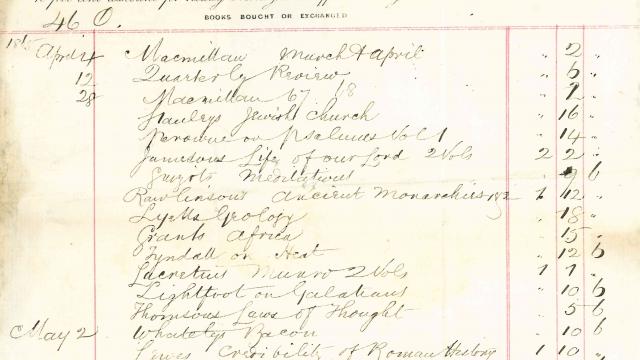Surviving from the 1830s and 1860s are a series of accounts and receipts used by the College in the compilation of its annual audit. The receipts surviving from 1865 include a number relating to library book purchases, some from companies still in existence today. Books were purchased from Macmillan and Co, Deighton, Bell and Co, J. Hall and Son and the Cambridge University Press. Looking at one account in particular, that from Macmillan and Co from the Easter Term of 1865, the Assistant Librarian and Archivist have been able to ascertain that some of the books purchased are still in the College collection today.

Reference: XXVI/4
Towards the bottom of the receipt can be seen listed 6 books by Owen; that is in fact Sir Richard Owen, the English biologist and palaeontologist. Today he is perhaps best remembered for defining the category of large terrestrial reptiles that he named Dinosauria (meaning "Terrible Reptile" or "Fearfully Great Reptile"). 3 of the books purchased are still housed in the College.

This book was actually a lecture that was delivered at Senate House in Cambridge in May 1859, to which was subsequently added appendices On the gorilla and On the extinction and transmutation of species.
Reference: D.5.40

Description of the Skeleton of an Extinct Gigantic Sloth Mydoldon Robustus was part of a vast array of publications by Owen in the 1840s that significantly contributed to the the study of palaeontology and comparative anatomy.
Reference: M.3.18

The last book purchased on the Easter Term account was Odontography, or, a Treatise on the Comparative Anatomy of the Teeth. The plate above shows the forms of teeth in extinct reptiles.
Reference: F.7.2-3
The selection of these and other books such as Sir Charles Lyell's Geology and Robert Grant's Africa reflects the growing interest in natural history that stemmed from the work of Charles Darwin in the 1850s.




